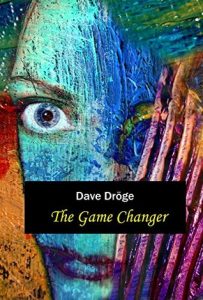★★★★ 
The Game Changer by Dave Dröge is a complex, character-driven portrait of individual revolution. To say this novel is unusual is an understatement, but certainly not a critique. The Game Changer has countless different angles and subplots for readers to devour, ranging from visceral descriptions of Rotterdam to complex familial relationships and tough moral quandaries.
The crux of the novel is the connection between Henk van Wijnen-Swarttouw, prominent businessman and entrepreneur, whose empire stands in stark contrast to his daughter’s progressive outlook on life. Julia is a passionate focal point, freshly graduated from high school, and using her interim year before entering medical school to flex her muscles as a performance artist.
Standing in direct rebuttal to all that her father represents, her challenging life choices become a point of obsession for Henk, who is facing his own crisis of faith, given the investigations into his taxes and business dealings. Feeling detached from his expected reality, he dives into fully understanding hers, trying to gain perspective on the mind of a liberated young person, who also happens to be his daughter. This fascination has a dark edge, however, as Henk seems to be spying, rather than supporting, and some of his narration and actions are downright disturbing.
The intricate, philosophical balance between these two characters could carry this story – a woman blossoming into a conscientious and visionary green warrior, and an old man shriveling into self-doubt and deluded obsession – but Dröge also creates a rich secondary cast that creates much of the intrigue and drives the plot along. Readers are exposed to a broad gamut of emotions – jealousy, deception, depression, fear and exhilaration – all played out beautifully among the lanes of this Dutch city.
As more people become aware of the crumbling business and mental state of Henk, divisive lines are drawn in the sand, which come across as symbolic battle lines between the old world and the new – traditional vs. progressive, stability vs. revolution, logic vs. passion. Julia is a fascinating and dynamic force in the novel, but the convoluted mind of Henk is where Dröge shows his mastery of language and deep understanding of human nature’s fickle core.
The writing itself is dense and difficult at times, and some of the language seems awkwardly used, as though it were poorly translated, or colloquial Dutch phrases were forced into common English parlance. In terms of editing, there are also a significant number of errors that can be distracting from the reading experience, particularly when combined with the stilted language. Some of the self-reflective comments within the narration also break with the clear first- and third-person fluctuations of the chapters. The writing could use a solid line edit to polish some of the weaker prose, but the ideas and execution of the novel are impressive, to say the least.
Overall, The Game Changer is ambitious and affecting, as are the emotional moments that the author chooses to highlight. This is not an easy book, by any means, but it is rewarding in surprising ways, and doesn’t shy away from the darker corners of modern life, nor the inherent conflicts of personal revolution.
Links
Author Site
Amazon
Goodreads
STAR RATING
Design
Editing
Content
Get an Editorial Review | Get Amazon Sales & Reviews | Get Edited | Get Beta Readers | Enter the SPR Book Awards | Other Marketing Services























Leave A Comment